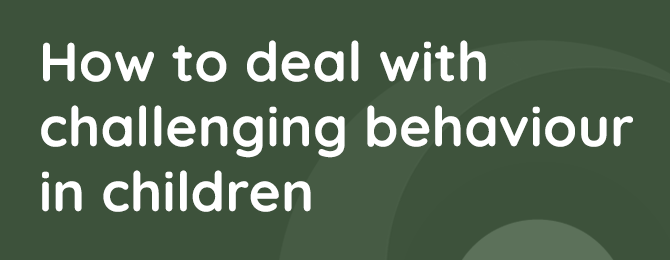How to deal with challenging behaviour in children

A person's behaviour can be defined as "challenging" if it puts them or those around them (such as their carer) at risk or leads to a poorer quality of life.
It can also impact their ability to join in everyday activities.
Challenging behaviour can include:
- aggression
- self-harm
- destructiveness
- disruptiveness
Challenging behaviour is often seen in people with health problems that affect communication and the brain, such as learning disabilities.
What can you do to help?
As a carer, try to understand why the person you look after is behaving in this way. For example, they might feel anxious, bored, or in pain.
If you can recognise the early warning signs, you may be able to prevent behavioural outbursts.
For example, if being in a large group of people makes your child feel anxious and they become agitated, you could arrange for them to be in a smaller group or have 1-to-1 support.
Some people find a distraction can focus a person's energies elsewhere and prevent them from displaying challenging behaviour.
Your child might behave in a challenging way to get your attention.
If this is the case, consider not responding directly to their behaviour, although you should not ignore them completely.
But if their behaviour puts them or someone else at risk, you'll need to intervene as calmly as possible.
Professional help
If you're finding it hard to cope with the behaviour of your child, ask a GP to refer you to a specialist.
The specialist will want to know what situations or people trigger the behaviour, what the early warning signs are, and what happens afterwards.
In extreme circumstances—for example, if your child's behaviour is harmful to themselves or others and all methods of calming them have been tried—a doctor may prescribe medicine.
If you're concerned about the side effects of medicine, speak to your child's GP.
Sexual behaviour in children
Sexual exploration and play are a natural part of childhood sexual development and help children develop physically and emotionally.
- Read the NSPCC's information on sexual behaviour in children
- Read the NSPCC's information on the normal behaviours typical of each development stage
Sometimes children show sexual behaviour that's inappropriate or unexpected for their age. This can be because of:
- curiosity
- anxiety
- traumatic experience
- a learning disability
- a mental health problem
If a child acts inappropriately in public, try to distract them with another activity. This can be a useful way to defuse the situation.
If you think a child's behaviour is related to an illness, speak to the healthcare professionals involved in their care and ask for advice on how to manage their behaviour.
They can tell you about local or national organisations that could help.
If you're concerned about the safety or welfare of a child, contact the NSPCC helpline on 0808 800 5000.
Plymouth's Local Offer is organised into four main categories covering the following age ranges:
- Early years (0 to 5 years old)
- Primary (5 to 11 years old)
- Secondary (11 to 18 years old)
- Preparing for adulthood
Is the information correct?
Let us know if the information on this page is wrong and needs to be updated.






